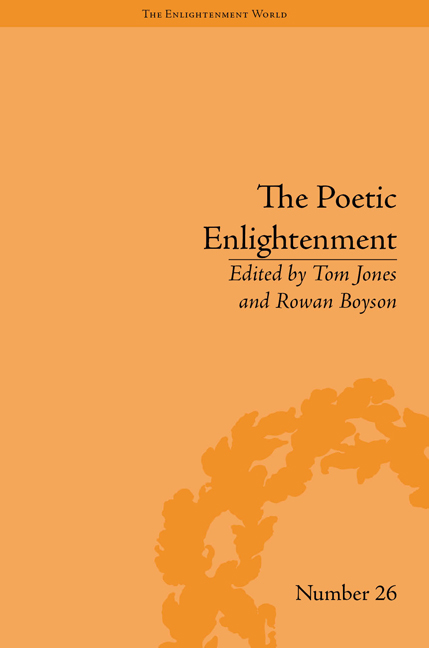Book contents
- Frontmatter
- CONTENTS
- Acknowledgements
- List of Contributors
- General Introduction
- I Poetic Knowledge and the Knowledge of Poetry
- II Poetic Theories of the Social Self
- 5 Introduction
- 6 Hobbes and Davenant: Poetry as Civil Science
- 7 Facing the Misery of Others: Pity, Pleasure and Tragedy in Scottish Enlightenment Moral Philosophy
- 8 Poetical Stoical Shaftesbury
- 9 Morality as a Discourse of the Imagination
- III Enlightenment and Romantic Poetologies
- Notes
- Index
8 - Poetical Stoical Shaftesbury
from II - Poetic Theories of the Social Self
- Frontmatter
- CONTENTS
- Acknowledgements
- List of Contributors
- General Introduction
- I Poetic Knowledge and the Knowledge of Poetry
- II Poetic Theories of the Social Self
- 5 Introduction
- 6 Hobbes and Davenant: Poetry as Civil Science
- 7 Facing the Misery of Others: Pity, Pleasure and Tragedy in Scottish Enlightenment Moral Philosophy
- 8 Poetical Stoical Shaftesbury
- 9 Morality as a Discourse of the Imagination
- III Enlightenment and Romantic Poetologies
- Notes
- Index
Summary
Whilst Anthony Ashley-Cooper, third Earl of Shaftesbury's aesthetic theory has received substantial attention, the literary, and specifically poetic, dimensions of this theory have received far less. Shaftesbury was not, of course, himself a poet, nor were his views on poetry straightforwardly receptive or engaged. Modern ‘poets’, he wrote, barely deserve the name for ‘having attained the chiming faculty of a language with an injudicious random use of wit and fancy’. They are the most ‘insipid race of mortals’ ‘anywhere to be found’ he wrote, deprecating Shakespeare, Fletcher, Jonson and Milton in turn. An example taken from a work he celebrates as the ‘justest of modern poems’ – John Sheffield's (Lord Mulgrave's) Art of Poetry (first published 1682) – might make us wonder whether this great theorist of ‘taste’ was sadly deficient when it came to evaluating verse:
Here I should all the various sorts of Verse,
And the whole Art of Poetry rehearse,
But who that task can after Horace do?
The best of Masters and Examples too!
Yet, in this chapter I hope to show that Shaftesbury's poetic theory is richly interesting both for an understanding of his larger philosophical project, and for the way it speaks to current literary-critical preoccupations. Shaftesbury explicitly relates the domains of poetry and philosophy, relations that have returned to the forefront of much literary criticism focused on the long eighteenth century.
But where modern scholars link poetry and philosophy through, for example, the cognitive aspects of verse, or theories of affect and feeling, or modern disciplinarity, Shaftesbury finds a different conduit for their relations: the Stoic tradition of self-division and dialogue. Poetry is figured by Shaftesbury as a form of work on the human self enjoined by Stoic philosophy, and here a distinctively poetic contribution to Enlightenment ‘human science’ may begin to be traced.
- Type
- Chapter
- Information
- The Poetic EnlightenmentPoetry and Human Science, 1650–1820, pp. 89 - 104Publisher: Pickering & ChattoFirst published in: 2014



